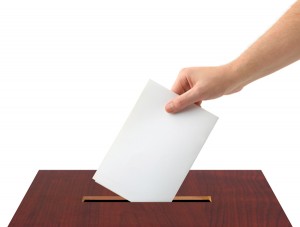 By Steve Brawner
By Steve Brawner
© 2016 by Steve Brawner Communications, Inc.
Are you dissatisfied with the candidates but uncomfortable voting for the “lesser of two evils.” Maine may have a solution: ranking your choices.
Mainers will vote this November on implementing ranked choice voting, where in a multi-candidate race they would mark their first, second and third choices. If no candidate receives a majority, then the candidate with the fewest first place votes is eliminated. Their votes are awarded to their voters’ second choice candidates. If there’s still no majority winner, the process continues until one candidate has a majority.
Such a system is uncommon but not unheard of. In Arkansas, military and overseas voters rank their choices because there isn’t time to mail them a ballot if there is a runoff. According to FairVote, an election reform supporter, 11 cities elect their city officials using ranked choice voting. It’s how Ireland chooses its president and Australians their Parliament.
Supporters say such a system, otherwise known as instant runoff voting, ensures winning candidates have majority support. Under the current system, when there are multiple choices, the favorite candidate of a minority can be elected over several candidates with broad appeal who split the vote. Party primaries below the presidency solve that problem with runoffs, which are costly and often attract a low turnout. But general elections are winner take all, which, through the Electoral College, is how Bill Clinton became president in 1992 with 43 percent of the vote.
A ranked choice system also makes it easier for voters to vote their conscience. Voters are forever being told they must vote for the major party candidate they fear least lest they help the more objectionable candidate win. Voters in a ranked choice system can support the candidate who reflects their values, giving him or her a fighting chance, while their second choice votes will go to their preferred – or less unpreferred – major party candidate.
Supporters say a ranked choice system forces candidates to try to appeal to a broader slice of the electorate and to run a more positive campaign. Current campaigns are won by firing up the base by pitting Americans against each other. In a ranked choice system, second choice voters may provide the margin of victory, so candidates have an incentive not to alienate them.
Ranked choice voting really is no different than how we make decisions elsewhere in life. Sometimes the doughnut shop is out of our favorite, so we pick our second favorite from among a wide selection. Under the current system, voters often have only two doughnuts from which to choose, both of which they may dislike – or there may be a third that’s in the back that no one tells them about.
The negatives? Ranked choice voting is more complicated, would require investing in new voting technology, and may not make much of a difference in Arkansas.
Maine has a history of multi-candidate elections where the governor is elected by a minority – less than 40 percent in five of its last 11 elections. One of its U.S. senators, Angus King, is an independent.
Arkansas does not have a strong third party presence or a history of independent candidates, though it did vote for independent George Wallace for president in 1968. There lately haven’t been a lot of races with multiple credible candidates for major offices, or a lot of runoffs in party primaries.
Maine’s proposal does not apply to the presidential race, which is governed by both state law and party rules. Arkansas would have had to work with the national parties to implement ranked choice voting before this year’s primaries, and who knows how that would have turned out. But there would be no problem changing the law for the general election.
It’s clear that Americans are unhappy with their democracy. Typically they respond by trying to change people, which is why Trump and Sen. Bernie Sanders, two candidates very different from the norm, won so much support. But attempting change through people is often disappointing because the system keeps one person from having too much power, thank goodness. To make lasting change, change the system.
Is ranked choice voting the best way to do that? I’m willing to try this doughnut, or at least let Mainers do it and ask them how they like it.
The main thing I would say about our voting system is that we should make it much easier to vote than harder. We should get as many people as possible registered and make it super easy to vote. Why are the Baltic states ahead of us in voting technology? Why in this age of computers are we not voting electronically from our electronic devices? Why do we allow so much voter suppression, put people in long lines to vote by outdated technology, shift people around from voting place to voting place, feign to find solutions to a problem (voter fraud) that is virtually non-existent, and throw up so many roadblocks in so many places? We know that one of our parties specializes in voter suppression. How long are we going to allow this to go on? We must look like a nation of idiots to a lot of the democracies that are looking on.
Sounds like a feasible plan. I know both parties need to rethink this abysmal primary system. Do it all on the same day or not at all. I realize this makes campaigning difficult, but the present system obviously isn’t working very well.